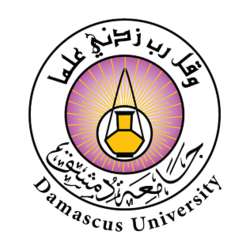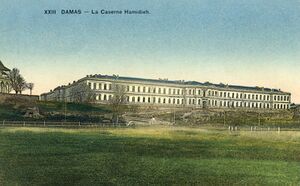Damascus University
(University) | |
|---|---|
 | |
| Motto | "وَقُل رَّبِّ زِدْنِي عِلْمًا" |
| Formation | 1923 |
| Headquarters | Damascus, Syria |
| Type | Public |
| One of the most reputable universities in the Middle East before the war in Syria started in 2011 | |
The University of Damascus (جامعة دمشق, Jāmi‘atu Dimashq) is the largest and oldest university in Syria, located in the capital Damascus and has campuses in other Syrian cities. It was founded in 1923 through the merger of the School of Medicine (established 1903) and the Institute of Law (established 1913). Until 1958 it was named the Syrian University, but the name changed after the founding of the University of Aleppo. There are nine public universities and more than ten private ones in Syria. Damascus University was one of the most reputable universities in the Middle East before the war in Syria started in 2011.
The University of Damascus consists of several faculties, higher Institutes, intermediate institutes and a school of nursing. One of the institutions specializes in teaching the Arabic language to foreigners, which is the largest institution of its kind in the Arab world.[1]
History

In 1901, the establishment of the Office of the School of Medicine in Damascus was approved and in 1903 this school, which is the nucleus of the University, opened. The school included branches in medicine and pharmacy, and the language of instruction was Turkish.
In 1913, a Law School opened in Beirut, in which most of the teachers were Arabs and the language of instruction was Arabic. Then this school was transferred to Damascus in 1914 just as the School of Medicine moved to Beirut. Then in the last years of the First World War the Law School returned to Beirut.
Following that the Institute of Medicine and the School of Law opened in Damascus, the former at the beginning of January in 1919 and the latter in September of the same year.
In 1923, the School of Law was named the Institute of Law and this institute was linked together with the Institute of Medicine, the Arab Society, and the Center of Arabic Heritage in organization under the name of the Syrian University. Then the Arab Society and the Center of Arabic Heritage separated from the organization in 1926.
In 1928, the School of Higher Literary Studies was established and it immediately connected its administration with the University. In 1929 it became the School of Letters, which closed in 1935/1936.
Then starting in 1946, the University was no longer limited to the Institutes of Medicine and Law, but rather faculties and higher institutions were created in other subjects.
In 1958, a new law was created to regulate the universities in the northern and southern regions of the United Arab Republic. This led to changing the name of “the Syrian University” to “Damascus University” and to the creation of a second northern university called “the University of Aleppo.” [2]
In 1959, The College of Fine Arts was established in Damascus and became part of Damascus University in 1972.[3][4]
Notable people
Al-Assad family
- Bashar al-Assad Syrian president since year 2000
- Maher al-Assad Syrian general and commander of the Republican Guard
- Bushra al-Assad daughter of Hafez al-Assad
- Basil al-Assad eldest son of President of Syria Hafez al-Assad
- Rifaat al-Assad the younger brother of the former President of Syria, Hafez Assad
Other
- Rached Ghannouchi Tunisian Arab Spring politician, lived 22 years in London
- Mahmoud Abbas he president of the State of Palestine and Palestinian National Authority
- Khaled al-Asaad – Syrian archaeologist and the head of antiquities at the ancient city of Palmyra
- Muhammad al-Yaqoubi – Syrian Islamic scholar and religious leader
- Rasha Abbas – author and journalist
- Rashad Barmada – served as deputy prime minister of Syria and minister of defense
- Giles Clarke – chairman of the England and Wales Cricket Board[5]
- Colette Khoury – Syrian novelist
- Dina Katabi – Syrian Professor in the Department of Electrical Engineering and Computer Science at MIT and the director of the MIT Wireless Center
- Gyorgy Busztin – Hungarian Ambassador and U.N. Deputy Special Representative
- Sa'id al-Afghani – former student, then Professor and Dean of the Faculty of Arts
- Abdelsalam al-Majali – former Prime Minister of Jordan
- Riad Ismat – Syrian diplomat, writer and theatrical director
- George Percy, Earl Percy – British businessman and the heir apparent to the Dukedom of Northumberland
- Gerhard Schröder – former chancellor of Federal Republic of Germany, Awarded an Honorary Doctorate
- Nizar Qabbani – Syrian poet, author and diplomat, awarded a B.A. in Law
- Abbas al-Noury – Syrian actor, author, Director and TV presenter, awarded a B.A. in History
- Duraid Lahham – Syrian actor, author, Director and TV presenter, awarded a B.Sc. in Chemistry and Physics
- Farouk al-Sharaa – Syrian politician and diplomat, Syrian Vice President, awarded a B.A. in English Literature
- Aref Dalila – Syrian economist and politician, awarded a B.Sc. in Economics
- Ali Farzat – Syrian caricaturist and painter – awarded a B.A. in Fine Arts
- Ibrahim Mughrabi – football striker, studied law before moving to Greece to continue his studies
- Georges Tarabichi – prominent Syrian writer
- Riad Barmada – Syrian-American orthopedics surgeon,
- Imran Raza Ansari – politician, Shia cleric and cabinet minister in Jammu & Kashmir
- Louay Kayali – Syrian modern artist
- Marwan Kassab-Bachi – German painter of Syrian origin
- Abdul Halim Khaddam – Vice President of Syria and "High Commissioner" to Lebanon from 1984 to 2005
- Moustapha Akkad – Syrian American film producer and director
- Nazim al-Qudsi – Was the President of Syria
- Nureddin al-Atassi – was President of Syria
- Mahmoud Zuabi – was Prime Minister of Syria from 1987 to 2000
- Muhammad Mustafa Mero – Former Prime Minister of Syria from 2000 to 2003
- Bashir al-Azma – Was Prime Minister of Syria and later as a Minister in the United Arab Republic (UAR)
- Farouk al-Sharaa – Was foreign minister of Syria from 1984 until 2006 when he became Vice President of Syria
- Georges Sabra – president of the Syrian National Council
- Haitham al-Maleh – Syrian human rights activist and former judge and one of the most important opposition figures in Syria
- Shadia Habbal – Syrian-American astronomer and physicist
- Ghada al-Samman – Syrian writer, journalist and novelist
- Omar Alghabra – Member of the Parliament of Canada
- Sadiq Jalal al-Azm – Professor of Modern European Philosophy
- Ghassan Kanafani – Palestinian author and a leading member of the Popular Front for the Liberation of Palestine (PFLP)
- Sirin Hamsho – Syrian engineer and inventor
- Khalid Bakdash – leader of the Syrian Communist Party and the "dean of Arab communism"
- Akram al-Hawrani – One of the founders of Ba'ath Party and vice-president of the United Arab Republic
- Omar Bakri Muhammad – Syrian Salafi Islamist militant leader
- Bashar Bizrah - Facial Plastic Surgeon, Author and academic
Alumni on Wikispooks
| Person | Born | Nationality | Summary | Description |
|---|---|---|---|---|
| Mahmoud Abbas | 26 March 1935 | President of the State of Palestine and President of the Palestinian National Authority, for what it's worth. | ||
| Ziad Abu-Amr | 1950 | Palestine | Author Politician | Double Bilderberger Palestinian leader who attended Georgetown |
| Kamal Alam | UK | Academic Consultant | Fellow of the Institute for Statecraft, | |
| Bashar al Assad | 11 September 1965 | President of Syria | ||
| Ed Husain | 25 December 1974 | UK | Author Academic | |
| Faisal Mekdad | 1954 |
References
- ↑ http://www.csmonitor.com/2005/0510/p14s02-legn.html
- ↑ https://web.archive.org/web/20150825012336/http://damasuniv.edu.sy/english/about-university/historical-background-
- ↑ Lloyd, Fran (1999). Contemporary Arab Women's Art: Dialogues of the Present. London: Women's Art Library. p. 82
- ↑ Bloom, Jonathan; Blair, Sheila, eds. (2009). The Grove Encyclopedia of Islamic Art and Architecture. New York: Oxford University Press. p. 261
- ↑ https://www.telegraph.co.uk/sport/cricket/international/england/12131794/Giles-Clarke-to-leave-England-and-Wales-Cricket-Board-in-bid-to-become-International-Cricket-Council-chairman.html